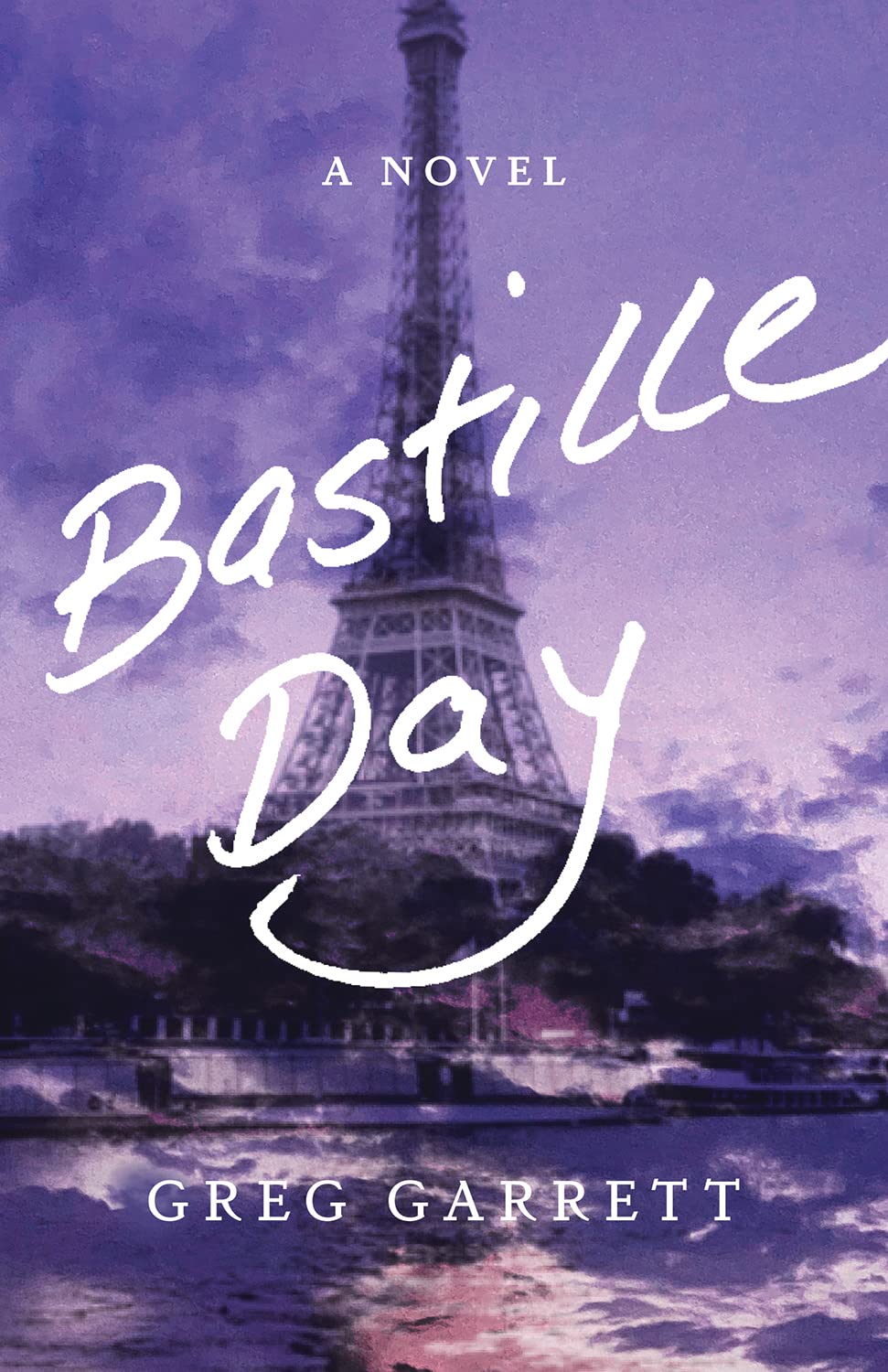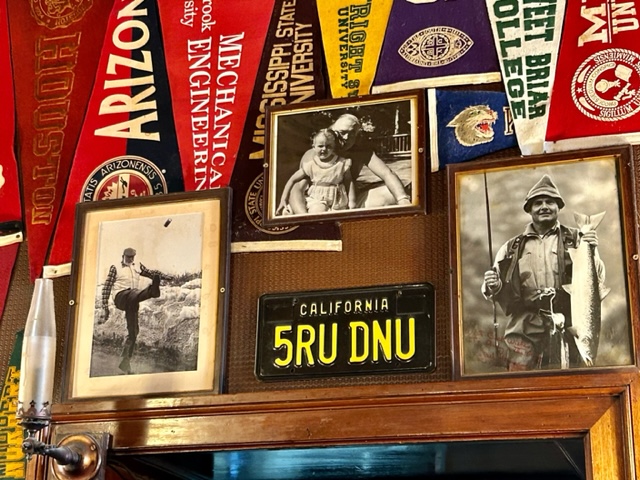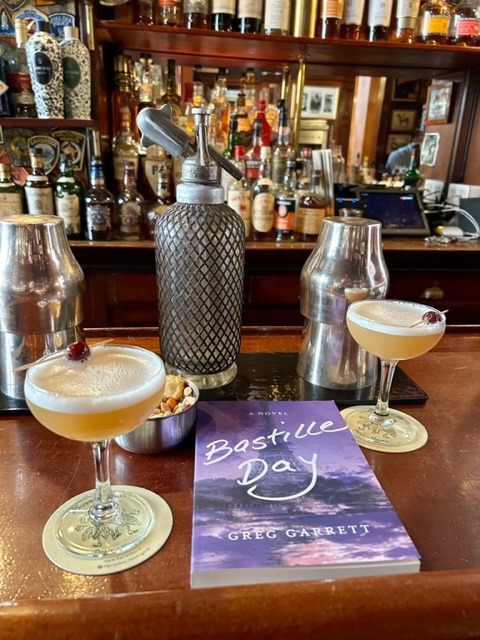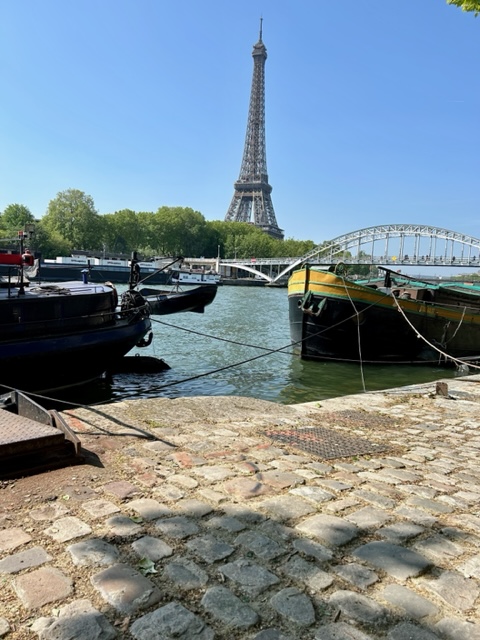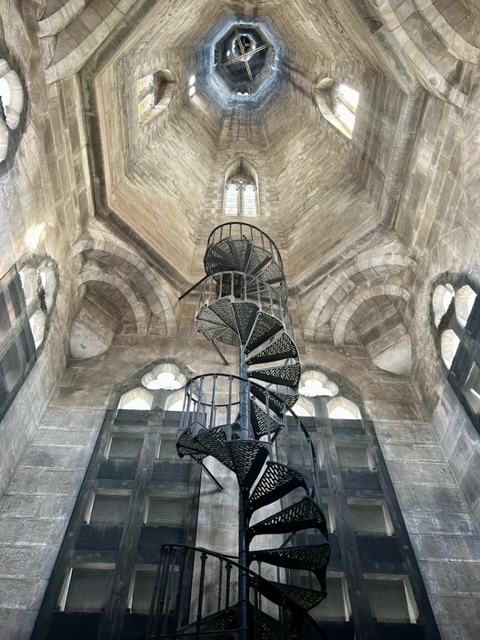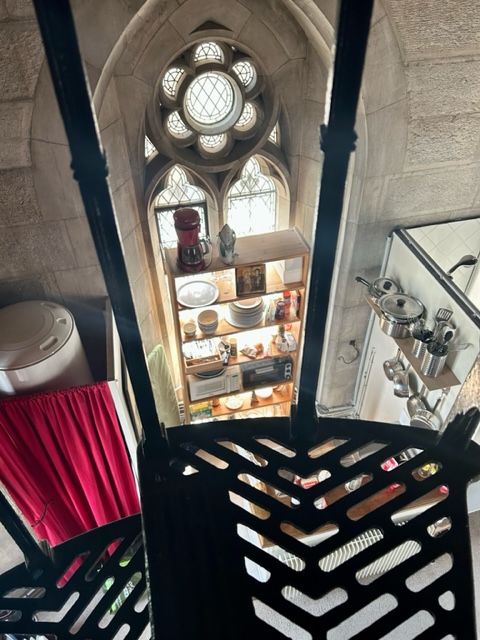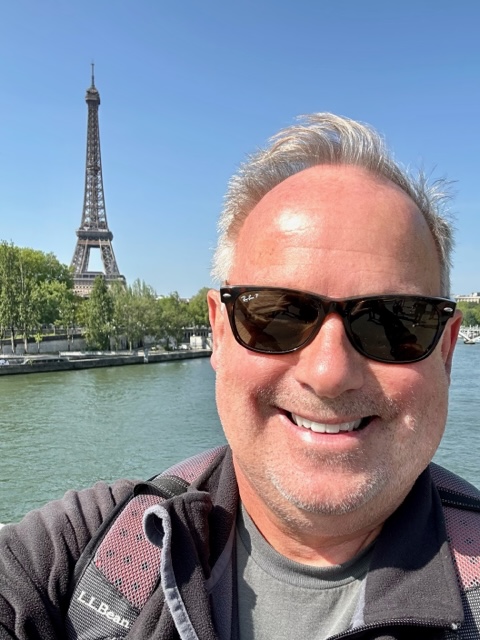
Greg Garrett in Paris for the launch of his new novel, Bastille Day. (Photos with this article courtesy of Greg Garrett.)
.
‘Sometimes the world … breaks our hearts and shakes our hope.’
.
“It is this Jesus—the Jesus who calls us to dangerous unselfishness, the Jesus who tells us that we love and serve God by coming near to those in distress, the Jesus who teaches that there are no parties or sides, that, beloved, we all stand on human ground—it is this Jesus we meet this morning.”
From a climactic sermon in Bastille Day by Greg Garrett
.
By DAVID CRUMM
Editor of ReadTheSpirit magazine
Readers who have been enjoying Greg Garrett’s moving and thought-provoking fiction and nonfiction through the years will not be surprised to learn that his dramatic new novel, Bastille Day, turns on one particular broadcast by a cynical TV reporter and one particular sermon by a compassionate pastor.
These are worlds Greg has bridged in his long career as a media personality, theologian, scholar and author.
It’s not a spoiler to say that the climactic sermon is so moving that readers are likely to quote from it in the future. The Rev. Dr. George Mason—who we just featured in last week’s Cover Story about his new book The Word Made Fresh—joined in a global Zoom conversation with Greg to make that very point. Greg conducted that Zoom event from the American Cathedral in Paris, where he serves part-time as canon theologian.
As one of America’s master preachers, George joined the conversation and told the global Zoom audience: “As a preacher, I was taken by the sermon at the cathedral in Bastille Day. The theology of evil and suffering in it is unsurpassed.”
George paused then added: “Greg, you made us preachers proud.”
And what about the authenticity of Greg’s main character—a multiply traumatized network-TV war correspondent, Calvin Jones, who is sent to Paris to report on terrorist attacks in 2016?
Greg researched all of his fictional characters’ lives before completing this novel, including talking to friends like David W. Peters, whose own new book, Post Traumatic Jesus, will be featured in a ReadTheSpirit Cover Story next month. Peters served as an enlisted Marine and Army Chaplain and was deployed to Iraq in 2005. Peters’ own experience mirrors some of Calvin Jones’ hard-earned wisdom in the novel.
“Greg and I talked as he was writing Bastille Day,” Peters told me. “And, now that I’m reading the book myself, I can see some of what we talked about reflected here. For veterans I’ve known, myself included, combat trauma opens a much deeper wound inside us that is unable to be healed or medicated or numbed in the normal ways people do. In Bastille Day, he really captures the way that kind of trauma affects relationships and our ability to function in the world.”
So, from expert early readers like these, we know that Greg has believably captured the realities of the main characters who collide as the events in this novel unfold.
On the depiction of journalists, including Calvin, I can add my own affirmation that Greg has nailed a lot of the professional personalities I have known through 50 years as a journalist, reporting from the U.S. and other parts of the world.
This careful attention to authenticity won’t surprise Greg’s regular readers. After all, his career as an author has moved from one grand challenge to another. A restless researcher and writer, his books surprise readers each time a new title is announced. His previous book, which I also highly recommend, is A Long, Long Way—Hollywood’s Unfinished Journey from Racism to Reconciliation. Now, for summer reading in 2023, he has given us this novel, Bastille Day. Then, in September he will launch a book about one of his mentors: James Baldwin. Stay tuned later this year for an interview with Greg about Baldwin. No question: That’s an astonishing breadth of research for any author!
Three R-words: resilience, renewal and reconciliation are themes that run throughout Greg’s 20-or-so books, because both his fiction and his nonfiction are shaped by his own journey in faith. That journey has led him to ordination as an Episcopal priest and an appointment as the “canon theologian” occasionally in residence at the American Cathedral in Paris.
And that phrase means literally “in residence” at the Cathedral for some weeks each year. As his novel is launching, Greg has enjoyed hosting Zooms with readers and interviewers from an “apartment” in that cathedral where he and his wife Jeanie stayed in May 2023. That apartment, which I enjoyed seeing as I Zoomed with Greg for our author interview, looks more like a stone-walled cell in the Tower of London than what we would think of as a living space. But that same Cathedral tower apartment-space also is one of the many real-life settings in Paris that readers will enter in Bastille Day.
So, what is Greg doing in a cathedral tower in Paris?
“Can you explain for us this unusual appointment you have in Paris?” I asked Greg in our Zoom interview. “I think most of your readers probably know you as a professor of literature and culture at Baylor in Texas.”
Greg said, “In Episcopal life, one of the offices a person can hold is canon and I am the canon theologian for the American cathedral here. Before that I was called the theologian in residence here. So, this is a community I’ve been visiting for about 10 years now for teaching, preaching, writing, research and building partnerships. If I total up my time here, I’ve spent something like eight months here in Paris, staying in one of the apartments here.
“I have spent so much time here at the Cathedral, now, that this has became one of my communities of faith. I mean that, wherever else I might be in the world, I can think of this group of Christians here as friends who care about me and my family and the work that I do—so much so that they help to make that work possible.”
On the reality of trauma from terrorism
“Bastille Day is ‘based on a true story,’ the movie version will say someday,” I said to Greg. “You have deliberately set this novel in 2016. The story opens after the tragedies of the January 2015 Île-de-France attack and the multiple attacks in Paris in November 2015. That’s why Calvin’s TV network has sent him to France, because more violence is anticipated. Then, it’s no secret that, in 2016, Bastille Day was the occasion for a horrific attack in Nice. I would assume readers of your novel in France understand what’s going to happen in this novel the moment they see the title and open to the first page that is dated in early July 2016.”
“Yes, readers here remember that attack in Nice on Bastille Day in a way that Americans may not,” Greg said. “And there’s more to that title reference, of course.”
“Yes, the title makes multiple references, but I don’t want to spoil any of the suspense for readers. Mainly, I want to stress in our interview that you’re taking readers to quite a number of real places.”
“Yes, in researching this novel, I can say that I have spent time in most of the locations myself, carefully taking note of each setting—and that includes all of the locations in Paris and Nice. There’s even that scary winding staircase in the cathedral in the novel and, from where I am sitting right now, I can see those stairs,” Greg said. “I wanted to carefully research these places to really get my head around what happened there, particularly in Nice.”
I said, “Without revealing too much, I can say that Calvin really is not you in this book, but Calvin embodies parts of you. Parts of your personality are spread across a couple of characters, I would say.”
Greg agreed and added, “Well, talking about that staircase—I gave Calvin my own fear of heights, which is very real. And I did experience some of the things Calvin experiences in the novel, like watching fireworks over Paris and hearing the news from Nice.”
On capturing reporters’ habits
“I really enjoyed your authentic sense of how journalists work—and also some of their preferences after a day’s work is done,” I said. “When I’ve traveled around the world with other journalists, I know we collectively like to visit spots our mentors have frequented, like the American Colony Hotel in Jerusalem or the Long Bar at Raffles Hotel in Singapore. Here, you serve up some vivid scenes at Harry’s in Paris.”
I added, “However, one of the truths we all learn about these places is that some of them don’t exactly stand up to their storied reputations, do they?”
“I will say it this way: My wife Jeanie prefers something a bit more upscale than Harry’s, so she is not eager to go back there,” Greg said. “But, for myself, I go to Harry’s on every trip I take to Paris because of the incredible amount of journalistic history at Harry’s. Last week, I posted online from Mr. Hemingway’s chair at Harry’s. The story is that Hemingway could drink 30 whiskey sours in one visit! I find that hard to believe, but that’s the story.
“I’m a deeply religious person and take the sacred seriously, but I can say that Harry’s feels like a sacred space to me,” Greg continued. “Hemingway felt he belonged here and that’s one of the main things that the characters in my novel are searching for: a space, a community where they feel they belong.”
The authenticity of the final sermon
Finally, we talked about the climactic sermon in the novel. I pointed out to Greg that it may sound odd to potential readers to describe a sermon as a dramatic high point in a suspenseful novel. “But it’s true and it’s not a spoiler to point out that this particular moment—an actual sermon—plays a key role in what unfolds,” I said. “You really elevate the power of preaching by daring to use that format in such an important part of the novel.”
“It fits with what I teach students about public speaking,” Greg said. “I tell students: ‘You have to earn the speech.’ Speeches themselves usually are not dramatic. I’m now 35 years into teaching at Baylor and I keep making this point: ‘You can’t give a speech or deliver a sermon unless you’ve earned it.’ When you reach those places in the novel where someone is talking—Calvin to his TV audience or in that final sermon—they have earned the right to speak.”
I wanted him to continue to explain these choices in the narrative, so I said, “And I hear that you actually delivered a version of that final sermon yourself—so it has that added level of authenticity, doesn’t it?”
“Yes, I was the original preacher of that sermon and I continue to think of that as one of the most important preaching opportunities I’ve had in my life—to speak at a moment like that to a full cathedral about the possibility of finding hope.”
And without spoiling the plot, that’s a good way to explain and authenticate the intriguing format Greg has chosen for those dramatic passages.
Yes, there is violence throughout this novel, because that’s the quest on which this TV correspondent finds himself. But this also is a novel that leaves readers with a sense of fulfillment and reassurance as we reach the final pages. I wouldn’t call it a happy ending. I would call it an authentically aware and very satisfying conclusion, which is rare in fiction today.
.
Care to see more of Greg Garrett’s Paris?
.
.
